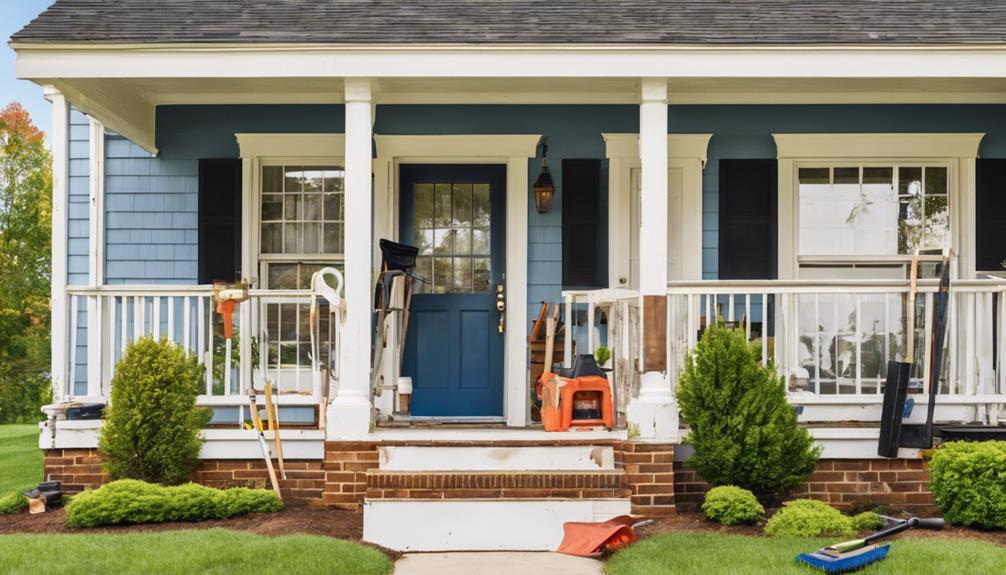When you're considering home improvements in York County, VA, understanding the Home Improvement Contracting Bond is essential for protecting your investment. This bond not only ensures that your contractor adheres to local regulations but also provides you with financial security if things go wrong. You might wonder how this bond differs from insurance or what happens if a contractor operates without one. As you explore these aspects, you'll uncover critical information that could make or break your renovation experience.
What Is a Contracting Bond?

Understanding what a contracting bond is can help you navigate the home improvement process more effectively. A contracting bond is a legal agreement between a contractor, a property owner, and a third party, typically a bonding company. It ensures that the contractor will complete the work as agreed upon and adhere to local laws and regulations.
This bond serves as a form of financial security for the property owner, protecting against potential losses if the contractor fails to meet their obligations. If something goes wrong, like the contractor failing to finish the job or not following regulations, you can make a claim against the bond.
When you hire a contractor, you should always check whether they've a valid contracting bond. This acts as a safety net for you, giving you peace of mind that you're protected from potential financial losses. If the contractor doesn't fulfill their obligations, the bond can cover the costs of hiring someone else to finish the job or rectify issues.
It's important to note that not all contractors are required to have a bonding license, which can vary by state and project type. Always verify the bond's details before signing a contract.
Importance of the Bond
The significance of a home improvement bond can't be overstated; it provides essential protection for homeowners during the renovation process. When you're investing time and money into your home, you want to ensure that your project is handled professionally and responsibly.
A contracting bond serves as a safety net, giving you peace of mind that the contractor is financially capable of completing the job. Additionally, these bonds are designed to safeguard consumers against financial harm from dishonest practices, similar to used car dealer bonds, ensuring that contractors adhere to regulations and standards.
Having this bond in place indicates that the contractor is committed to adhering to local regulations and standards. It also shows that they've passed certain qualifications, boosting your confidence in their ability to deliver quality work.
If issues arise, like incomplete work or failure to meet contractual obligations, the bond can provide you with recourse.
Additionally, this bond can deter potential fraud. Knowing that they're bonded, contractors are less likely to cut corners or engage in unethical practices.
In a market where home improvement scams can occur, having that layer of protection makes a significant difference. Ultimately, a home improvement bond is more than just a piece of paper; it's a crucial component of a secure and successful renovation experience.
How the Bond Protects Homeowners

Homeowners often find themselves facing potential risks during renovation projects, but a home improvement bond consistently offers a layer of protection. This bond serves as a safety net, ensuring that if a contractor fails to meet their obligations, you won't be left high and dry. By utilizing Wisconsin Surety Bonds, homeowners can ensure compliance and protect their investments.
When you hire a bonded contractor, you gain peace of mind knowing that there's financial backing in place should issues arise. If the contractor doesn't complete the work, or if they leave you with shoddy results, the bond can help you recover losses. You can file a claim with the surety company, which will investigate the situation and may provide compensation for repairs or unfinished projects.
Additionally, the bond encourages contractors to uphold industry standards and fulfill their commitments. They're more likely to perform quality work and adhere to timelines, knowing they're accountable to the bond. This accountability can lead to smoother interactions between you and the contractor, ultimately resulting in a better renovation experience.
In essence, a home improvement bond not only protects your investment but also fosters a sense of security throughout your home renovation journey.
Requirements for Contractors
When hiring a contractor for your home improvement project, it's important to know what requirements they must meet to be bonded. First, ensure they hold a valid contractor's license specific to your state and locality. This license verifies their expertise and ability to comply with local building codes and regulations.
Next, the contractor must provide proof of liability insurance, which protects you from potential damages during the project. This insurance is crucial for covering accidents or mishaps that may occur on your property.
Additionally, your contractor should have a surety bond. This bond acts as a safety net, ensuring that they adhere to their contractual obligations. If they fail to meet these obligations, you can file a claim against the bond for compensation.
Lastly, check for any local registration requirements. Some jurisdictions require contractors to register with local authorities, providing an extra layer of security for homeowners.
Application Process for the Bond

Obtaining a York County home improvement bond involves several key steps to ensure you're protected during your project.
First, you'll need to gather the necessary documentation. This usually includes proof of your business license, insurance certificates, and any relevant permits. Make sure all your paperwork is accurate and up-to-date.
Next, research bonding companies that are licensed to issue bonds in Virginia. You'll want to compare their terms and conditions to find the best fit for your needs.
Once you've selected a bonding company, you'll need to complete their application form. Be prepared to provide personal information, business details, and specifics about your projects.
After submitting your application, the bonding company will conduct a background check. This may involve reviewing your credit history and evaluating your financial stability.
Be honest in your application; any discrepancies could delay the process or result in rejection.
Costs Associated With the Bond
Understanding the costs associated with a York County home improvement bond is vital for budgeting your project effectively. The bond itself typically requires an upfront fee, which can vary based on the bond amount and your creditworthiness.
Generally, you can expect to pay a percentage of the total bond value, often ranging from 1% to 3%. This means if you need a $10,000 bond, your premium could be between $100 and $300.
In addition to the premium, there might be other fees involved. Some surety companies charge a processing fee or application fee, which can add to your initial expenses. You should also be aware of any renewal costs if your project takes longer than anticipated.
Moreover, your financial history plays a significant role in determining your bond costs. A solid credit score might help lower your premium, while poor credit could increase it.
It's essential to shop around and compare quotes from various surety companies to ensure you're getting the best deal. By understanding these costs, you can better prepare your budget and avoid surprises as you embark on your home improvement project.
Bond vs. Insurance: Key Differences

Bonds and insurance serve different purposes in the realm of home improvement projects, and grasping these distinctions can save you time and money.
A bond is primarily a guarantee that a contractor will fulfill their obligations. If they fail to do so, the bond can provide you with compensation for any losses incurred. Essentially, it protects you from non-compliance or incomplete work.
On the other hand, insurance is designed to protect the contractor and you from unforeseen events, like accidents or damage during the project. If a worker is injured on your property or if property is accidentally damaged, insurance covers those costs.
It's crucial to understand that while both bonds and insurance offer some level of protection, they operate in distinct ways. A bond is about ensuring performance, while insurance deals with risk management.
When hiring a contractor, always confirm they've both a valid bond and adequate insurance coverage. This way, you can ensure your project runs smoothly and that you're financially protected against potential issues.
Consequences of Not Having a Bond
What happens if you choose to forgo a bond when hiring a contractor? You might find yourself in a precarious situation.
Without a bond, you won't have a financial safety net if the contractor fails to complete the job or doesn't adhere to the agreed-upon standards. This could leave you with unfinished work, and you may need to hire another contractor to fix the issues, leading to unexpected costs.
Additionally, skipping the bond could expose you to liability for any damages or injuries that occur on your property during construction. If a worker gets injured and there's no bond in place, you could be held responsible for their medical expenses.
Moreover, not having a bond can make it difficult to hold the contractor accountable. If they disappear or don't deliver on their promises, you might've little recourse to recover lost funds. This can result in both financial loss and a frustrating experience.
Ultimately, forgoing a bond can increase your risks and complicate the home improvement process, making it essential to ensure that your contractor is bonded before starting any work.
Tips for Homeowners

When embarking on a home improvement project, it's crucial to take proactive steps to protect your investment.
Start by thoroughly researching contractors. Look for licensed and insured professionals, and don't hesitate to request references. A reputable contractor should have a solid track record and positive reviews.
Next, always get a detailed, written estimate before any work begins. This estimate should outline the scope of the project, materials used, and a timeline. Clear communication is key; discuss any concerns or changes upfront to avoid misunderstandings later on.
Don't forget to check for permits. Depending on the project, certain improvements may require local permits. Your contractor should handle this, but it's wise to verify they're obtained.
Lastly, consider securing a home improvement contracting bond. This bond protects you financially if the contractor fails to complete the work or doesn't adhere to the contract.
It's a safety net that can save you from potential losses. By taking these steps, you'll ensure your home improvement project runs smoothly and remains a worthwhile investment.
Resources for More Information
To dive deeper into home improvement bonds and related topics, various resources are available to help you make informed decisions.
Start by visiting the Virginia Department of Professional and Occupational Regulation (DPOR) website. They provide comprehensive information on licensing requirements, bonding, and consumer protection laws related to home improvement contracting.
You can also check out local government websites, like York County's, for specific regulations and guidelines. They often have resources tailored to residents, including FAQs and contact information for local officials who can assist you.
Industry organizations, such as the National Association of Home Builders (NAHB), offer valuable insights on best practices and standards in home improvement contracting. Their websites often host articles, webinars, and tools to help both homeowners and contractors.
Online forums and community groups can also be great places to gather firsthand experiences and advice from others who've gone through similar projects.
Remember to engage with reviews and ratings on contractor platforms, which can provide additional context on potential hires.
Conclusion
In York County, VA, a Home Improvement Contracting Bond is essential for protecting your renovation investment. By ensuring your contractor is bonded, you're safeguarding against potential issues and promoting accountability in their work. Remember, the bond isn't just a formality; it's your safety net. Always verify a contractor's licensing, insurance, and bonding status to ensure a smooth renovation experience. Stay informed and proactive, and you'll enjoy a successful home improvement project with peace of mind.


